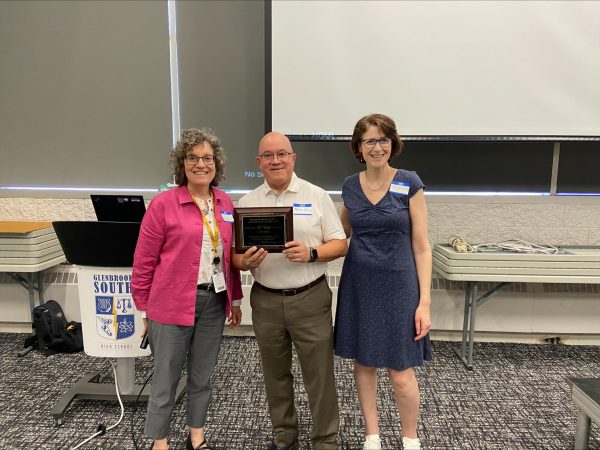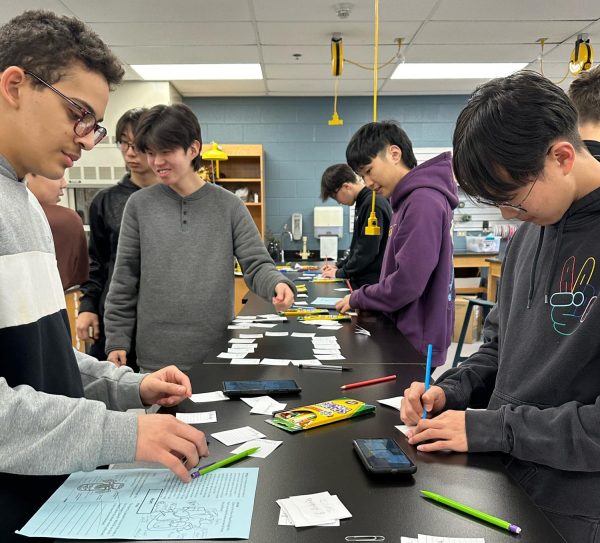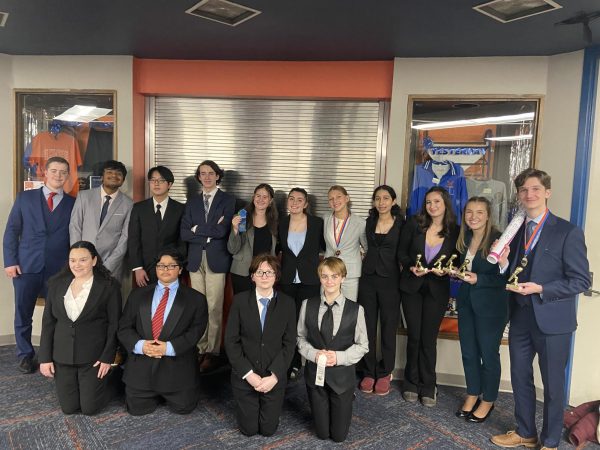Election season leaves South with tough conversations
November 20, 2020
The 2020 presidential election has created dissent across the country, and with a polarized electorate, it has become an unavoidable topic in many communities, including South. Although South is home to many differing political views, Principal Dr. Lauren Fagel believes that the school has been respectful and has remained politically neutral as an educational institution, however, she stressed that human rights are excluded from this neutrality.
Despite supporting political discussions and helping students navigate through these essential topics, Ryan Kinsella, social studies teacher, believes that discussing human rights is not a political conversation.
“While I firmly believe every student has a right to their own political beliefs, that does not include the right to violate the dignity, safety, or rights of another student or group of people,” Kinsella said. “That has no place in a classroom.”
A recent video made by a South student, which included homophobic slurs, caused the reevaluation of what constitutes political speech, as the slur, and the name “Trump”, were both stated in the video. Fagel stressed that the video, threatening in nature, was not a matter of politics, but rather a concern of student safety.
“I feel very strongly that it’s not [political],” Fagel said. “I also feel like we have a responsibility to ensure that our students feel safe because if you don’t feel safe, you can’t learn. It’s not just physical safety, but it’s also emotional safety and social safety. We sent a school-wide email that said we support our LGBTQ+ students, that this is unacceptable, and that’s not who we are.”
As a voting member of society, senior Margaret Wills feels that South has not swayed her politically, as her classes have always provided both sides of political arguments. However, social justice should continue to be excluded from this neutrality, Wills said.
“Others could argue that talking about topics such as human rights is an issue of politics and a teacher providing their opinion on these topics is unprofessional, but I disagree,” Wills said. “I believe that a teacher can provide their opinion in order to make students feel welcome in their classes.”
South has implemented policies to ensure that the school does not encounter issues with bipartisan political expression. District 225 Superintendent Dr. Charles Johns explained that the neutrality the district upholds in political matters is outlined in district policy.
“The District 225 policy titled ‘Controversial Issues’ addresses the responsibility of staff to assist students in a critical examination of various issues and different voices,” Johns said. “The policy instructs teachers to ensure that discussions are informative, balanced and objective. Furthermore, the policy explicitly defines as ‘inappropriate’ any ‘emotional criticism of individuals, ideas or movements during classroom presentations.’”
South continues to incorporate politics in the curriculum in classes such as debate. The Debate Team at South has created an environment for students to learn about debate techniques and apply them in respectful political discussions. Despite strong opposing viewpoints, students have upheld a welcoming and impartial community, Director of Debate Alyssa Corrigan said.
“For the first couple of weeks in a first-year debate class, discussing politics can feel a little odd because it’s just not something folks are used to doing in school,” Corrigan said. “However, once people figure out that they’re truly not going to be judged for their political beliefs, we can discuss and disagree without it being an issue.”
Although political beliefs may not be the same throughout the debate team, there was a mutual agreement as students assessed the Presidential Debates that the candidates did not display many of the qualities that are taught in the classroom. Junior Ally Smith* acknowledges that neither President Donald Trump nor President-elect Joseph Biden approached the debate with proper technique or etiquette.
“The debates should be informative, not a place where Biden and [Trump] make fun of each other and call [each other] names [because] it’s very childish and both are at fault,” Smith said. “Personally, I think the candidates could learn a thing or two from high school national debate tournaments which are so much more informative and respectful, while still getting heated and addressing controversial topics.”
Outside of school hours, a heightened interest in political discussions led to the creation of the Political Discussions Club. The club is open to members of all political parties and is an outlet for students hoping to voice their opinions on the recent election. Mark Vodicka, Political Discussions Club sponsor, feels that his nonpartisan views are crucial to the club’s success.
“I think it’s my role, as an educator, not to show bias towards anything and to remain neutral,” Vodicka said. “I don’t voice my opinion on the topics. I monitor, and the discussions run themselves. I’m just there to support them and their right to free speech.”
Although engaging in political discourse has been of interest for some students, for others, it remains a source of stress. Social worker David Hartman has noticed an increase in students approaching Student Services due to stress stemming from the presidential election.
“Students feel stress from our current political climate for a number of reasons,” Hartman said. “I help teach behavioral and cognitive strategies for how to manage what they are thinking and feeling so that the stress they are experiencing abates. I merely try to listen well, reflect back what I hear, and help a person in the ways that they want.”
On Nov. 7, after being projected the winner of the presidential election by major decision desks, Biden addressed the nation with his victory speech, in which he emphasized unity. Biden declared that the United States should and will protect the inalienable rights of all American citizens, reaffirming South’s position that social justice is not a political matter.
“The American story is about slow, yet steadily widening the opportunities in America,” Biden said. “And make no mistake, too many dreams have been deferred for too long. We must make the promises of the country real for everybody, no matter their race, their ethnicity, their faith, their identity or their disability.”
*Name has been changed









